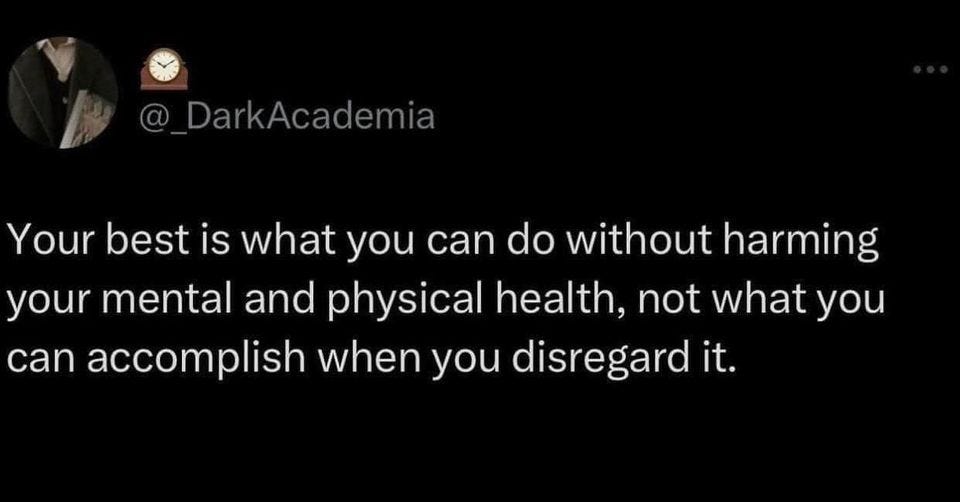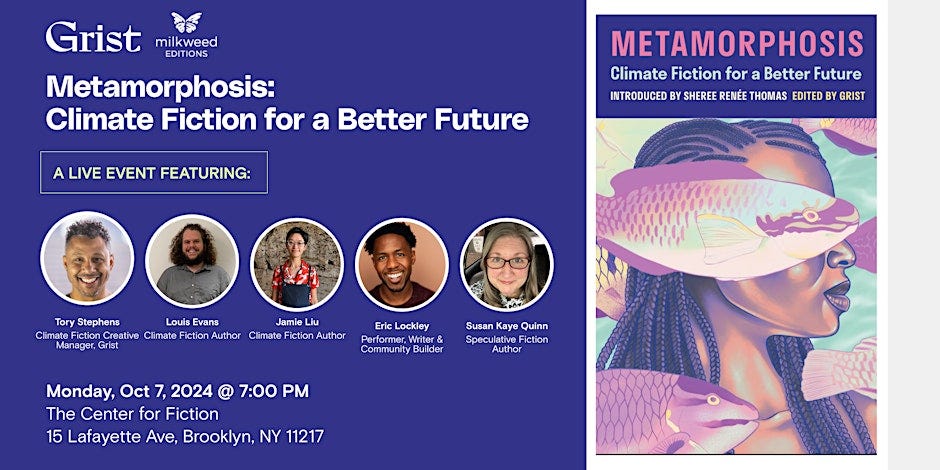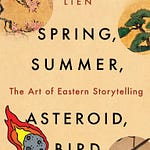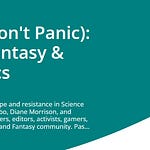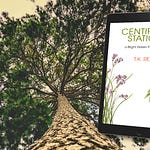Hello Friends!
Welcome to Bright Green Futures, Episode Twenty-One: Doing Your Part (in the Climate Fight)
I created Bright Green Futures to lift up stories about a more sustainable and just world and talk about the struggle to get there.
Today we’re going to talk about the “easy to say, hard to do” concept of doing your part in the climate fight. It’s been a few weeks since my last podcast because I’ve been running around the country (in my EV), teaching solarpunk classes, launching hopeful climate fiction collections, giving panels on the complexities of writing those kinds of stories, and meeting a range of people doing amazing things in the climate fight.
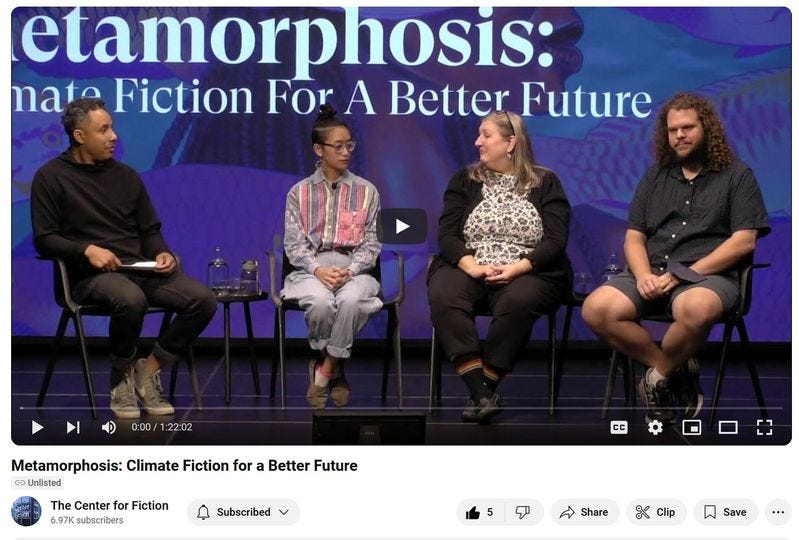
All of that has been both incredibly generative and also has illustrated how difficult it is to manage everything at once: there is perpetually more to do than can be done, and prioritization can feel existential, not only to getting the most “important” work done but also staying healthy and not burning out in the process. This is a very familiar struggle for activists everywhere.
As a novelist, I find it vexing precisely because writing requires enormous amounts of quiet time devoted to the creative act. Writing—especially writing climate fiction—has this built-in contradiction where it simultaneously requires that you be informed by the current events of the world while also requiring you to sequester away from the world to perform the act itself.
I jokingly say, “This novel isn’t going to write itself!” But the struggle to create while being immersed in an urgent worldwide crisis alongside everyone else is real.
As a sidebar, I am aware that the joke about the novel not writing itself hits differently in the age of AI, and I fervently wish AI companies would stop stealing artistic labor and proceed to fuck off into the sun. But it’s doubly ironic given AI is trained on the corpus of stories that have come before, and writing hopeful climate fiction is challenging precisely because it’s the opposite of that. I discussed this in my classes—it’s difficult to untrain our minds and our expectations, which have likewise been immersed in the corpus of stories that have come before, to create something that not only shows a blueprint for a better world (rather than reinforcing the status quo), but also buttresses the kind of hope that inspires, that says the future is worth fighting for. This is impossible for chatGPT, but more importantly, it is necessary for us.
As I said on my recent panel to launch Metamorphosis, we can’t keep telling the same stories that got us into the crisis. The reward for this challenging work is that these stories are intrinsically fresh and new and enlivening, precisely because they are doing something different. And they offer up climate solutions: not just the technology or social innovations within the stories, but the stories themselves are a kind of hope booster shot to keep us going.
One of the different things these stories do is to emphasize how none of us is the hero of this Save the World story. None of us can do this alone. We literally can only do our part, but at the same time, we must do that part. Yet, in real life, and in fiction, it can be tremendously difficult to discern what our part is and to have confidence that we’re making the right choice in whatever actions we decide to take.

My Nothing is Promised series of four novels has this idea integrated into the structure and the story, as four different characters are called to do their part. I was delighted by a wonderful review that saw that message clearly:
Here is where the message of the book shines: nothing is promised and nothing is set in stone. It can go either way, and it depends on each of us doing our part, no matter how big or small. We'll all be in a position where we are the right person to do the right thing, and it's not going to be easy or convenient, but we should take the chance and do our part while relying on our community. I believe that we need stories like this. Stories that give us hope and inspire to act.
It’s tremendously gratifying when someone sees the thing you put into your work.
Me writing that particular story (and all the others) is one way that I do my part. But there are a hundred other ways I could be doing that, and for the last month, I’ve been running all over the Northeast doing many of them. Which is exhausting and exhilarating, and I tried hard to keep some balance, but the thing that struck me most of all, through all of it, was the many people of all ages, but especially the young ones, pouring their hearts into doing the work and yet still—still, even though it’s incredibly obvious to me that they’re doing tremendous and important work—they still had doubts. They weren’t sure if what they were doing mattered, if it was important, whether it made a difference, if perhaps they should be doing something else instead, something that would matter more.
It’s a sign of the tremendous heart of these people that they care so deeply about “getting it right.” But the status quo advocates would like nothing more than for us to not take action. And this idea that it’s up to each of us, individually, to figure out what’s “most important” and somehow only do that thing is a holdover from our radically individualistic culture. It’s fine to be informed about options and tradeoffs, and most especially to see through the greenwashing the oil/gas industry throws at us, but we also need manage this need to do what’s “most important” so it doesn’t debilitate us. I’m very familiar with this because I struggle with it myself.
The most important thing to do (in fighting the climate crisis) is what you can.
I’m going to repeat that with a slight modifier because it’s so terribly important (and then we’ll dive into what I mean by this):
The most important thing to do is what you can, and especially what brings you joy.
Before I break that down into five easily-digestible parts, I want to make a blanket statement that the vast majority of the “debates” around whether one climate solution or another is “better” function primarily as delay tactics and these debates are much beloved by the status quo forces who want you stuck online debating EVs vs. public transit rather than out doing something to advance either one of those climate solutions. Friendly fire is the status quo’s favorite ammunition. These arguments are a tar pit of conflicting values with kernels of truth designed to suck people in. What we need is all of the above and to go faster because we’re in an emergency. Of course, there is room for reasonable debate, but not if it’s slowing you down. It's like debating whether you should rescue the flood victim with your big boat or your little boat when you don't have room for everyone—you just do what you can and keep going.
Even if we understand the futility of these kinds of debates with others (especially online), we often still hold the debates inside our heads. And that is also a paralyzing force that will keep you from doing what you can, right now.
Again: the most important thing to do is what you can.
I promised there were five parts, so here they are:
1 - There Is No “Most Important”
I know that flies in the face of our relentless desire to prioritize, but let’s think that through for just a second. Is it more important to develop solar technology or plant sustainable farms? Is it more important to negotiate high-level treaties between nations or negotiate with your town council to get curbside composting? All of those are important. All of them need doing. No one person is going to do all of it, certainly not you or me.
Pick one and get moving. And, if you can, bring others into the fight.
2 - Do What You Can Right Now.
It’s like folks in Asheville, North Carolina, working disaster relief from Hurricane Helene—is it more important to get water or diapers or food or electricity to people? Yes. All of the above. Load up your car with what you have and start getting it to people in need. We instinctively do this in a crisis, and embracing that crisis mindset is an important part of banishing the paralysis.
Plus, actually doing things unlocks the next things to be done—things you can’t even see until you start getting elbows deep in the work.
Let me pause in my urgent advocacy for urgency to say it’s entirely appropriate to be thoughtful about what needs to be done, to educate yourself (and others) about technologies or approaches or models for revolution. To take time to imagine and tell stories. In fact, there’s an incredible amount of education that’s needed to shift mindsets and even comprehend what needs doing. The key is to not get bound up in only doing “important” things. We have a tremendous amount of material and cultural work to do—we’re literally changing the way the world works, and there are millions of climate solutions out there, just waiting.
Start with one that’s within your reach.
3 - Do What Brings You Joy
I am here to tell you with steely-eyed pragmatic insistence that you must do the things that bring you joy. There are a whole host of practical reasons for this. You will have more energy when something pumps you full of joy. You will race toward it rather than enable all your inner hesitations and doubts. You will be better at it, especially the more you do it. And not least, bringing joyful acts into your activism means you’re living a better life, you’re caring for the human being that you are, the one who has needs and deserves a fulfilling life just like everyone else. You deserve joy. It is one of the rewards of being a sentient, living being and if we’re not working for more of that in the world, what are we even doing?

In my solarpunk writing class, I led an exercise that included people listing a few things that brought them joy. I meant that in the visceral sense: things like delighting in a flock of tiny birds that have come to feast on your crumbs or the deeper way you breathe when you walk into a forest.
Joy in activism is the moments that lift you up. For me, it’s actually teaching those classes. It’s looking a young activist in the eyes and telling him with my whole heart that the work he’s doing is special and important. It’s sitting with the new coreopsis tripteris native plant in my garden and drawing its crazy profusion of leaves in my research notebook for my novel.
Those moments power you up to stay in the fight.
4 - Do What You Can Do Sustainably
I mean sustainability of activism, not of the planet. When I say do what you can, I don’t mean run yourself ragged until you’re vulnerable to any random virus that’s floating through the air. I did that to myself twice this year, and that was a big red flag that I was succumbing to my old nemesis workaholism. I’ve been in the thrall of the tendency to work way too much, especially in times of crisis, for most of my life, but it was a lot easier to get away with when I was younger. Pacing yourself is a smart strategy, one that’s super hard for me to follow but that doesn’t stop me from recognizing the power of it. When I can manage it, I unlock all kinds of things: insight, creativity, inspiration, and yes, more energy to engage in the fight.
5 - Do What You’re Good At
We all have our own unique abilities and privileges, relative amounts of time, money, and capabilities (both mental and physical). I constantly find myself trying to spend things I have the least amount of or feeling guilty for not doing the things that are most difficult for me to do, and this is really the opposite of what one would call “productive” (even though I hate the terminology of capitalism with its productivities and efficiencies and human resources). In addition to being human beings that simply require rest and replenishment, we can best contribute to the fight when we’re leveraging the things we’re uniquely good at, as well as using the resources we have the most plentiful access to.
For me, that means paying a native plant landscaper to turn two patches of my yard into gorgeous botanical gardens—he has the knowledge and the crew to make it happen in one season, whereas I have neither and it would have taken me years. But I did have the money to pay for it, and it truly brought us all—landscaper, crew, and homeowner—a substantial amount of joy, as well as turning a tiny patch of the planet into an oasis habitat for native flora and fauna.
Meanwhile, with the time I’m not spending planting native species, I’m well suited to speak at the county board meeting in favor of taxing polluters to fund regulation. I’m the right person to write an OpEd in favor of pending clean energy legislation, and I’m a good candidate to have a film crew from an eco advocacy group come to my house to create a video about the benefits of solar and leveraging the tax benefits of the Inflation Reduction Act.
Finally, I’m the only person who can write that novel about plants and family and how we have to renegotiate our relationships with both.
All of those things are “doing my part.” They are all important. Someone needs to do all of them. The novel has lately been losing out in the competition for my time, so I’ll be making more room for writing it in the months ahead, and then the climate rom coms I have planned after that, and eventually the political series that debates the proper use of “violence” in the climate fight.
The podcast might be a little less frequent going forward, but I will keep growing it with more hopeful climate fiction stories and more episodes like this, encouraging myself and others to keep going, rest, power up with joy, and then keep going some more.
And to not worry so much about whether your part is the most important one.
The most important thing to do is what you can.
And to recap, here are the five parts:
1 - There Is No “Most Important”
2 - Do What You Can Right Now.
3 - Do What Brings You Joy
4 - Do What You Can Do Sustainably
5 - Do What You’re Good At
We don’t often talk about the tremendous opportunity to do good that the climate crisis presents—there are endless ways that you can do good things in a world that’s threatened with such a world-changing crisis. There are a whole lotta feels that go with that, but trust me:
If you’re engaged, you’re doing your part.
Bright Green Futures is a weekly newsletter/podcast. Check out the Featured Stories and Hopeful Climate Fiction lists for further reading. The best way to support the show is to subscribe and share the stories with your friends.
LINKS Ep. 21: Doing Your Part (in the Climate Crisis)
Solarpunk Author Panel launching Metamorphosis, NYC Oct 7th Recording
Metamorphosis: Climate Fiction for a Better Future (releases Oct 22, 2024)
Nothing is Promised by Susan Kaye Quinn
Climate Imaginarium on Governor’s Island NYC




